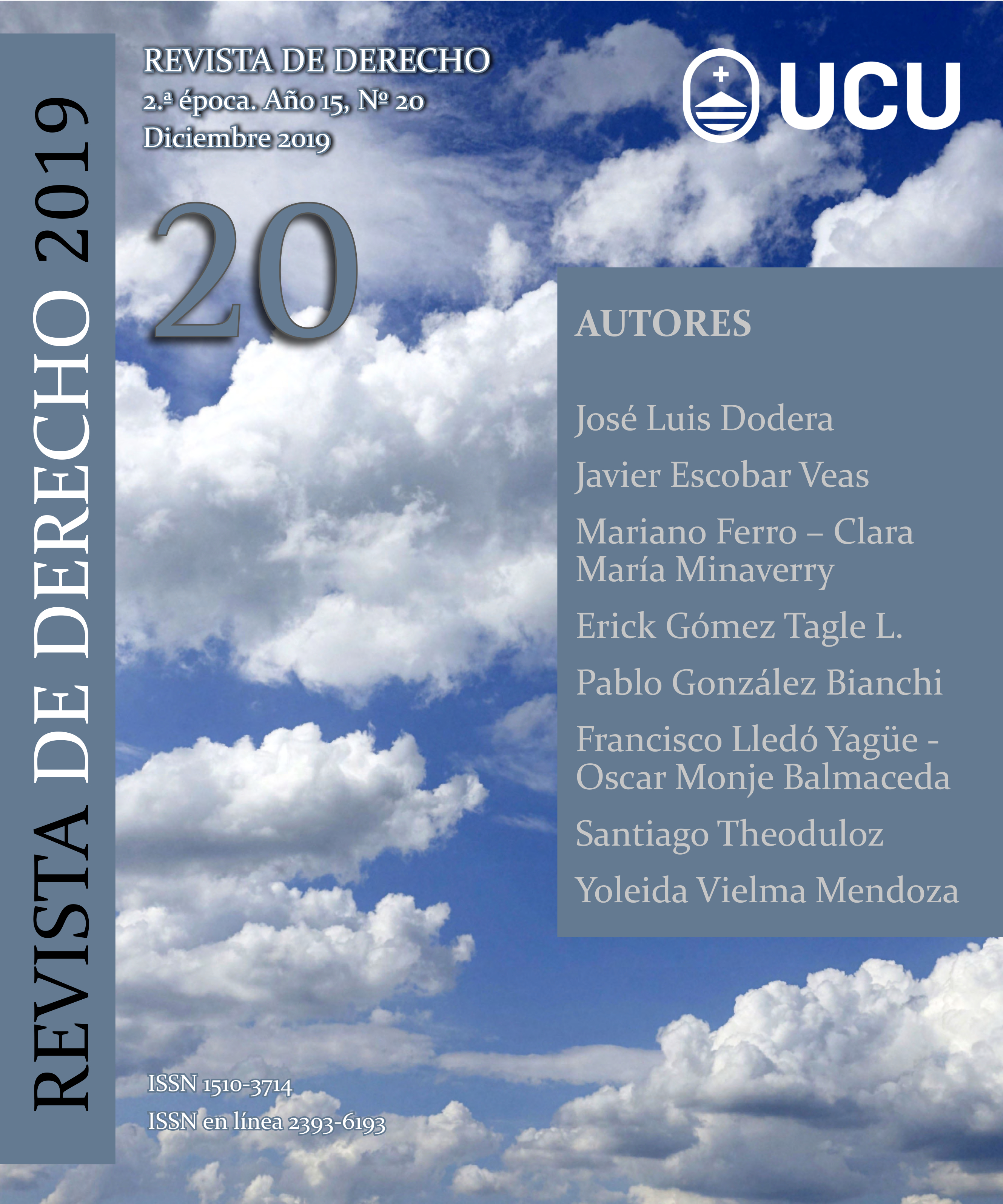Double Jeopardy and Dual Sovereignty Doctrine: Gamble v. United States
DOI:
https://doi.org/10.22235/rd.vi20.1842Keywords:
Double jeopardy, multiple prosecutions, dual sovereignty doctrineAbstract
In Gamble v. United States, the defendant questioned the constitutionality of the dual sovereignty doctrine under the double jeopardy clause. In its judgment, delivered on 17 June, 2019, the United States Supreme Court upheld the application of the dual sovereignty doctrine, according to which different sovereigns may prosecute an individual without violating the double jeopardy clause if the individual's act infringed the laws of each sovereignty. This comment aims to address the reasoning of the Supreme Court and the rationale of the dual sovereignty doctrine, suggesting the convenience and necessity of a further study on its limits and the possible safeguards against potential abuses.
Downloads
References
Adler, Adam. “Dual Sovereignty, Due Process, and Duplicative Punishment: A New Solution to an Old Problem”, Yale Law Journal, v. 124, n. 2 (2014): 448-483.
Allen, Ronald and Ratnaswamy, John. “Heath v. Alabama: A Case Study of Doctrine and Rationality in the Supreme Court”, Journal of Criminal Law and Criminology, v. 76, n. 4 (1985): 801-831.
Boyle, Richard. “Double Jeopardy and Dual Sovereignty: The Impact of Benton v. Maryland on Successive Prosecution for the Same Offense by State and Federal Governments”, Indiana Law Journal, v. 46, n. 3 (1971): pp. 413-427.
Brickman, Jay. “The Dual Sovereignty Doctrine and Successive State Prosecutions: Health v. Alabama”, Chicago-Kent Law Review, v. 63, n. 1 (1987): 175-188.
Colangelo, Anthony. “Double Jeopardy and Multiple Sovereigns: A Jurisdictional Theory”, Washington University Law Review, v. 86, n. 4 (2009): 769-857.
Cooney, John. “Multi-Jurisdictional and Successive Prosecution of Environmental Crimes: The Case for a Consistent Approach”, Journal of Criminal Law and Criminology, v. 96, n. 2 (2006): 435-464.
Cranman, Erin. “The Dual Sovereignty Exception to Double Jeopardy: A Champion of Justice or a Violation of a Fundamental Right”, Emory International Law Review, v. 14, n. 3 (2000): 1641-1679.
Dawson, Michael. “Popular Sovereignty, Double Jeopardy, and the Dual Sovereignty Doctrine”, Yale Law Journal, v. 102, n. 1 (1992): 281-303.
Fisher, Walter. “Double Jeopardy, Two Sovereignties and the Intruding Constitution”, The University of Chicago Law Review, v. 28, n. 4 (1961): 591-613.
King, James. “The Problem of Double Jeopardy in Successive Federal-State Prosecutions: A Fifth Amendment Solution”, Stanford Law Review, v. 31, n. 3 (1979): 477-504.
Revista de Derecho (UCUDAL). 2da época. Año 15. N° 20 (dic. 2019). ISSN 1510-3714. ISSN on line 2393-6193 243
King, Nancy. “Portioning Punishment: Constitutional Limits on Successive and Excessive Penalties”, University of Pennsylvania Law Review, v. 144, n. 1 (1995): 101-196.
Koklys, Andrea. “Second Chance for Justice: Reevaluation of the United States Double Jeopardy Standard”, John Marshall Law Review, v. 40, n. 1 (2006): 371-394.
McAninch, William. “Unfolding the Law of Double Jeopardy”, South Carolina Law Review, v. 44, n. 3 (1993): 411-505.
Mullen, Kayla. “Gamble v. United States: A Commentary”. Duke Journal of Constitutional Law & Public Policy, v. 14, n. 1 (2019): pp. 207-219.
Owsley, David. “Accepting the Dual Sovereignty Exception to Double Jeopardy: A Hard Case Study”, Washington University Law Review, v. 81, n. 3 (2003): 765-800.
Patraus, Darius. “The non bis in idem principle in the case law of the Court of Justice of the European Union -consistency or inconsistency?”, AGORA International Journal of Juridical Sciences, n. 1 (2018): 25-34.
Podgor, Ellen. “Department of Justice Guidelines: Balancing Discretionary Justice”, Cornell Journal of Law and Public Policy, v. 13, n. 2 (2004): 167-202.
Principato, Daniel. “Defining the Sovereign in Dual Sovereignty: Does the Protection against Double Jeopardy Bar Successive Prosecutions in National and International Courts”, Cornell International Law Journal, v. 47, n. 3 (2014): 767-785.
Reed, Akhil and Marcus, Jonathan. “Double Jeopardy Law After Rodney King”, Columbia Law Review, v. 95, n. 1 (1995): 1-59.
Rudstein, David. Double Jeopardy. A Reference Guide to the United States Constitution. Westport: Praeger, 2004.
Rudstein, David. “A Brief History of the Fifth Amendment Guarantee Against Double Jeopardy”, William & Mary Bill of Rights Journal, v. 14, n. 1 (2005): 193-242.
Sigler, Jay. “A History of Double Jeopardy”, American Journal of Legal History, v. 7, n. 4 (1963): 283-309.
Sigler, Jay. “Federal Double Jeopardy Policy”, Vanderbilt Law Review, v. 19, n 2 (1966): 305-405.
Shreve, Nina. “Expanded Application of Collateral Estoppel Defense in Criminal Prosecutions (United States ex rel. Rogers v. La Vallee)”, John's Law Review, v. 50, n. 2 (2012): 339-347.
Stoner, Ray. “Double Jeopardy and Dual Sovereignty: A Critical Analysis”, William & Mary Law Review, v. 11, n. 4 (1970): 946-959.
Revista de Derecho (UCUDAL). 2da época. Año 15. N° 20 (dic. 2019). ISSN 1510-3714. ISSN on line 2393-6193 244
Summers, Brian. “Double Jeopardy: Rethinking the Parameters of the Multiplicity Prohibition”, Ohio State Law Journal, v. 56, n. 5 (1995): 1595-1617.
Thomas III, George. Double Jeopardy. The History, the Law. New York: New York University Press, 1998.













